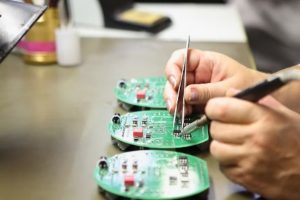Fuel business for strawberry farmers
.jpg)
A GNOSALL-based bioenergy business is celebrating the launch of its new plant following a significant funding package from NatWest.
Lower Reule Bioenergy Ltd, run by strawberry farmers Ian and Carol Critchley, has invested in an anaerobic digestor which will divert more than 15,000 tonnes of food waste a year away from landfill. This will reduce methane emissions and generate enough renewable electricity to supply more than 1,300 homes.
The new plant converts food and animal waste into biogases such as methane and carbon dioxide. These gases are used to power an on-site generator which supplies electricity to the National Grid. This is sold on to energy companies. One of the resulting byproducts – biofertiliser – is sold on to local farmers as a more sustainable alternative to traditional fertilisers produced using fossil fuels.
The Critchleys, who have banked with NatWest since the 1970s, are considering a novel use for the heat generated by the new digestor. They may redirect it to the polytunnels that house the crops for their strawberry farming business.
NatWest’s funding package has included an Enterprise Finance Guarantee loan, with further support from Lombard Asset Finance towards equipment costs. Lower Reule Bioenergy also received £750,000 capital grant funding from WRAP (the Waste & Resources Action Programme). It is one of the first bioenergy businesses in England to be backed by WRAP’s capital grant scheme designed to increase capacity to divert food waste from landfill.
The business has already set up contracts with several local authorities and businesses, including supermarkets, to recycle their food waste. Newcastle under Lyme Borough Council is already sending waste from its household food recycling scheme to the plant.
Ian Critchley, managing director of Lower Reule Bioenergy, said: “We’d thought long and hard about diversifying. Our strawberry business is doing well but we were really keen to set up another sustainable business, with no harmful by-products. Ian Clinton at NatWest and Ian Littleford at Lombard got to know us and our business, to understand exactly what we wanted to get out of the new venture. They both made it a pretty straightforward process. In fact, we are hoping to launch Phase 2 of the venture as early as June, to increase our capacity from 15,000 tonnes to 30,000 tonnes.”
Paul Jones, NatWest’s director of business and commercial banking in Shropshire, visited the new plant this week and said: “It’s great to support a sustainable business like this one, where even the waste products are being used to the full, generating income back into the business. This is a really good illustration of how agricultural businesses can diversify into new sectors, and I wish Ian and Carol all the best.”
Ian Littleford of Lombard Asset Finance said: “This new plant required significant investment. By working very closely with the Critchleys, we were able to identify a financial package that would give them all the kit they needed, within a manageable financial framework.”








